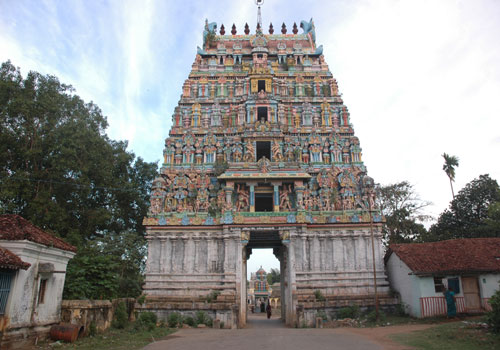Lord Shiva was under deep
meditation. The heat that emanated from the penance had its impact
everywhere. The Devas, unable to bear the heat, approached Lord Muruga
to stop Lords meditation and save them. But Muruga refused to disturb
His Fathers penance. They finally approached Manmatha. Without
thinking of the consequences, foolish Manmatha applied his love arrows
on Lord to disturb the penance.
Lord opened His eyes and burnt him with
the fire sparks from His third eye in His forehead. Rathi his wife
fell at Lords feet and begged for her husbands life. Lord assured her
that he would be sent to Devaloka for her on a new moon fortnight.
Thus Manmatha had his rebirth here.
Puthrakameshti Yaga is performed in the temple by those seeking child
boon. Lord is praised as Yogeswara. Mother Goddess is Gnambikai. As
Lord is in meditation for ever, it is difficult to have his darshan. It
is not possible to have the darshan when one desires it. Some obstacle
would intervene.
A devotee, lucky enough to have darshan when he
plans, would be blessed with the power of penance, it is believed. Lord
forgives anyone praying to him for sins committed unintentionally and
unknowingly. The Vimana above Lord Kurungai Ganapathi is of Gajapushta
design. People seek remedies for effects of past births, seek child
boon and celebrate their 70th birthdays in the temple. Those
surrendering at the feet of Lord Yogeswara get back their lost
properties. They are freed from lust and enmity qualities.
Cupid-Manmatha, the deity of love and lust was burnt here and had a
rebirth in this place.
Festival:
Masi Magam in February-March; 10 day Kamadagana utsav and Brahmmostsavam are the important festivals of the temple with Pancha Murthy
procession. Margazhi Tiruvadhirai in December-January with Lords
procession is the other great festival. Monthly pradosha days occurring
on the 13th of new moon and full moon fortnights; Navarathri in
September-October, Deepavali in October-November; Pongal or Makara
Sankranti falling almost on January 14 in each year; Tamil and English
New Year Days are also observed devotionally in the temple.
Opening time:
The temple is open from 7.00 a.m. and 12.00 a.m. and from 3.30 p.m. to 9.00 p.m.
The temple is praised by Saint Tirunavukkarasar in Thevaram hymns. This
is the 26th Shiva temple on the northern bank of Cauvery praised in
Thevaram hymns.
Sri Vinayaka of the temple is praised as Lord Kurungai Ganapathi. Of
the eight places known as Atta Veera Sthalas of Lord Shiva, this is the
place where cupid-Manmatha was burnt, hence Lord is praised as Kama
Dahana Murthy.
He appears in a sitting posture with His left leg
folded, right hanging down, right hand assuring His devotees with
Abhaya Mudra and the left hand on the left leg.
It is worthy to
note the places linked with the history of this temple in Kurukkai.
This is the place where Manmatha attempted to disturb the penance of
Lord. Kanganam Puthur is the place where he decided to disturb the
penance of Lord Shiva and tied the vow thread in his hand. He drank the
milk at Palakudi. Took his bow at Villinur. Aimed at the Lord at
Kavalamedu. Those who followed him at Ivanallur suggested action from
here. As the place was not suitable, Manmatha came to Mettu Korkai and
tried directions. Finally, he applied the arrow on Lord from a corner.
Prayer:
People praying to Veeratteswarar conquer lust, gain physical and mental
strength, cured of illness, initiation to deep medidation and all
noblest gifts. They gain complete mental peace, employment
opportunities, and development in business, promotion in jobs,
settlement of marriage and children.Devotees offer Kalyanamalai
(marriage garland), clothing, abishek in milk, curd, turmeric powder,
tender coconut, lime, honey, sandal etc.
Do's:
- Do pray your Ishta Devata before pilgrimage to Temple.
- Do contact Temple Devasthanam information centre for enquiry, temple information and for Pooja details etc.
- Do reserve your travel and accommodation at Temple well in advance.
- Do bath and wear clean clothes before you enter the temple.
- Do concentrate on God and Goddess inside the temple.
- Do maintain silence and recite your Istamantram to yourself inside the temple.
- Do observe ancient custom and traditions while in Temple.
- Do respect religious sentiments at Temple.
- Do deposit your offerings in the hundi only.
Don't s:
- Do not come to Temple for any purpose other than worshipping of God and Goddess.
- Do not smoke at Temple.
- Do not consume alcoholic drinks at Temple.
- Do not eat non-vegetarian food in the Kshetram.
- Do not approach mediators for quick Darshanam. It may cause inconvenient to others.
- Do not carry any weapon inside the temple.
- Do not wear any head guards like helmets, caps, turbans and hats inside the temple premises.
- Do not perform Sastanga Pranama inside the Sanctum Sanctorum.
- Do not take much time while performing Sparsa Darshanam to God in Garbhagriha.
- Do not buy spurious prasadams from street vendors.
- Do not encourage beggars at Temple.
- Do not spit or create nuisance in the premises of the temple.
